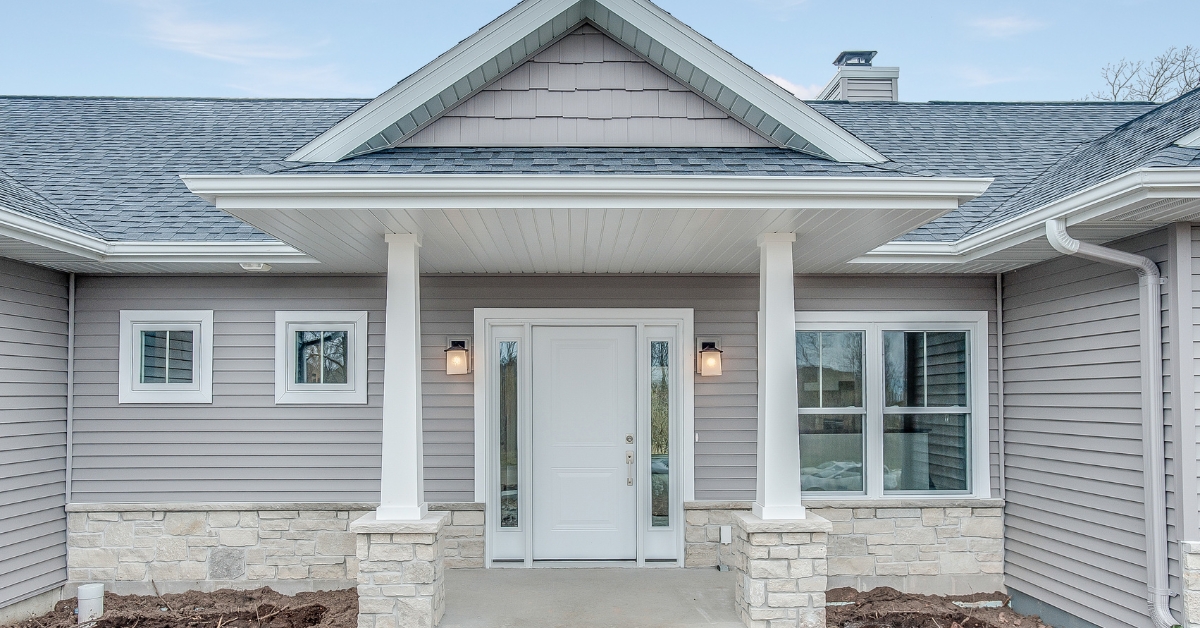Table of Contents
Replacing your entry door can help reduce unwanted noise in your home, especially if your current door is older, hollow, or poorly insulated. While no single upgrade can guarantee total sound blocking, a well-made and properly installed front door can noticeably soften outdoor noise and create a quieter living environment.
How Entry Door Replacement Helps With Noise Reduction
New entry doors reduce noise infiltration through improved materials, enhanced insulation, tighter seals, upgraded glass options, and professional installation. While results vary depending on the home and door selected, modern door construction is significantly more effective than the hollow or aging doors found in older homes.
Enhanced Door Materials That Naturally Block More Sound
One of the biggest advantages of a new front door is the improvement in core materials. Many older doors, especially hollow-core or lightweight models, allow sound to pass through easily. Modern fiberglass, steel, and solid wood entry doors are built with denser materials that absorb more sound, reducing the amount that reaches the interior of your home.
These materials are not marketed as soundproof, but they naturally provide better sound dampening simply because they are thicker, heavier, and designed for insulation. Homeowners upgrading from an outdated door often notice a meaningful reduction in outside noise after the replacement.
Improved Insulation and Internal Core Structure
Most new entry doors feature foam insulation or multi-layer internal cores that help limit both heat transfer and sound transmission. These insulated cores add density to the door, making it harder for noise to pass through the surface. This benefit is invaluable in busy residential areas or for homes located near traffic or active neighbors.
The insulation in modern doors also improves energy efficiency, helping regulate indoor temperatures and creating a more comfortable, quieter living environment overall.
Better Perimeter Seals and Weatherstripping
A significant amount of noise enters the home through gaps around the door rather than the door itself. Over time, weatherstripping wears down, compression seals flatten, and frames shift slightly, which creates small openings. These small gaps can make outside noise seem louder because there is less of a barrier to block sound.
New entry doors are manufactured with upgraded weatherstripping and perimeter seals designed to create a tighter, more consistent fit. This reduces noise, prevents drafts, and minimizes moisture intrusion – an important additional benefit for Georgia’s humid climate.
Multi-Pane or Decorative Glass That Reduces Sound Transfer
If your entry door has glass, the type of glass used will affect its noise-control performance. Many older doors use single-pane decorative glass that lets sound and heat pass through easily.
Newer doors often feature dual-pane or laminated glass, which reduces noise more effectively. Laminated glass, which contains a special interlayer, can soften noise levels compared to traditional decorative inserts. While not all glass is equal in performance, upgrading to modern, insulated glass panels can help limit sound transfer while still allowing natural light into your home.
Stronger Frames and Threshold Systems
Noise reduction isn’t only about the door slab – your frame and threshold play an important role as well. Older frames may be weakened, warped, or poorly sealed, allowing sound to seep in. New entry door systems use reinforced frames, insulated jambs, and updated thresholds that work together to create a more secure, airtight fit.
These improvements also enhance security and energy efficiency, giving homeowners several benefits from a single replacement.
Professional Installation Ensures a Tight, Noise-Reducing Fit
Even the best entry door will underperform if it isn’t installed correctly. A poorly fitted door often leaves gaps that allow noise, air, and moisture to enter the home. Professional installation ensures accurate measurement, proper alignment, secure fastening, and clean sealing around the entire door system.
This not only helps reduce noise but also improves energy efficiency, durability, and long-term performance. Choosing skilled installers is one of the most reliable ways to maximize the benefits of your new door.
Do Different Front Door Materials Help Reduce Noise?
Different entry door materials offer different levels of natural noise reduction. While results vary, choosing a door made from denser or insulated materials often helps create a quieter home.
Fiberglass Doors
Fiberglass entry doors are a popular choice because they combine durability, insulation, and design versatility. Their insulated cores help block sound, and the material itself resists warping, which helps maintain a tight seal around the frame. Fiberglass doors can offer noticeable noise improvement for homeowners upgrading from older, thinner doors.
Steel Doors
Steel doors are dense and naturally resistant to sound transmission. Many steel doors feature insulated cores, combining strength and sound reduction in a single system. They also form a tight seal when installed properly, which helps minimize noise infiltration. While not specifically marketed as soundproof, steel doors generally perform well in reducing outside noise.
Solid Wood Doors
Solid wood doors are heavy, which helps block sound through mass alone. While they may not insulate against temperature changes as efficiently as fiberglass or steel, their density can make them effective at reducing noise from the outside. Wood doors require ongoing maintenance to avoid warping, which is important for maintaining their noise-reduction benefits over time.
Doors With Large Glass Panels
Doors with glass inserts vary widely in sound performance. Single-pane glass allows more noise to pass through, while dual-pane or laminated glass can reduce noise more effectively. The performance largely depends on the type of glass used and how well the entire door system is installed and sealed.
Why Choose AAA Screen & Window for Front Door Replacement in Atlanta, Georgia
Entry door replacement can make your home more peaceful, comfortable, energy-efficient, and secure – as long as you choose the right materials and work with trained installers. AAA Screen & Window has served Metro Atlanta homeowners since 1959, providing professional guidance and expert installation for high-quality front door replacement. Our team helps you select the best door for your home’s style, comfort, and noise-reduction goals, while ensuring a precise fit that delivers long-term performance.
Schedule Your Entry Door Replacement Consultation
Upgrading your front door is a practical way to reduce outdoor noise, improve energy efficiency, and increase your home’s comfort. AAA Screen & Window offers expert guidance and professional installation to help you choose the right door for long-lasting performance. Contact us today to schedule a complimentary consultation and learn how the right entry door replacement can make your home quieter and more enjoyable.
FAQ About Entry Door Replacement & Noise Reduction
Accordion Content
Yes, a new front door can help reduce outside noise, especially if your current door is old or poorly insulated. Modern doors use denser materials, improved insulation, and better seals that soften sound and limit the amount that enters your home.
Generally, fiberglass, steel, and solid wood doors reduce noise more effectively than older hollow-core models. Each material performs differently, but doors with insulated cores or denser construction typically block more sound.
Yes, replacing worn weatherstripping can help reduce noise by closing small gaps around the door. However, if the door itself is thin, outdated, or damaged, weatherstripping alone may not provide a significant improvement.
It depends on the type of glass. Single-pane glass allows more sound to travel through, while dual-pane and laminated glass options generally offer better noise reduction. The quality of installation also affects performance.
Yes, professional installation is essential for achieving the best noise reduction results. Even a high-quality door won’t perform well if it isn’t sealed or aligned correctly, which can create gaps that let sound and air inside.
No, a new door will not make your home soundproof, but it can help reduce outside noise significantly. Choosing insulated materials, high-quality glass, and professional installation can make a noticeable difference in sound levels.

